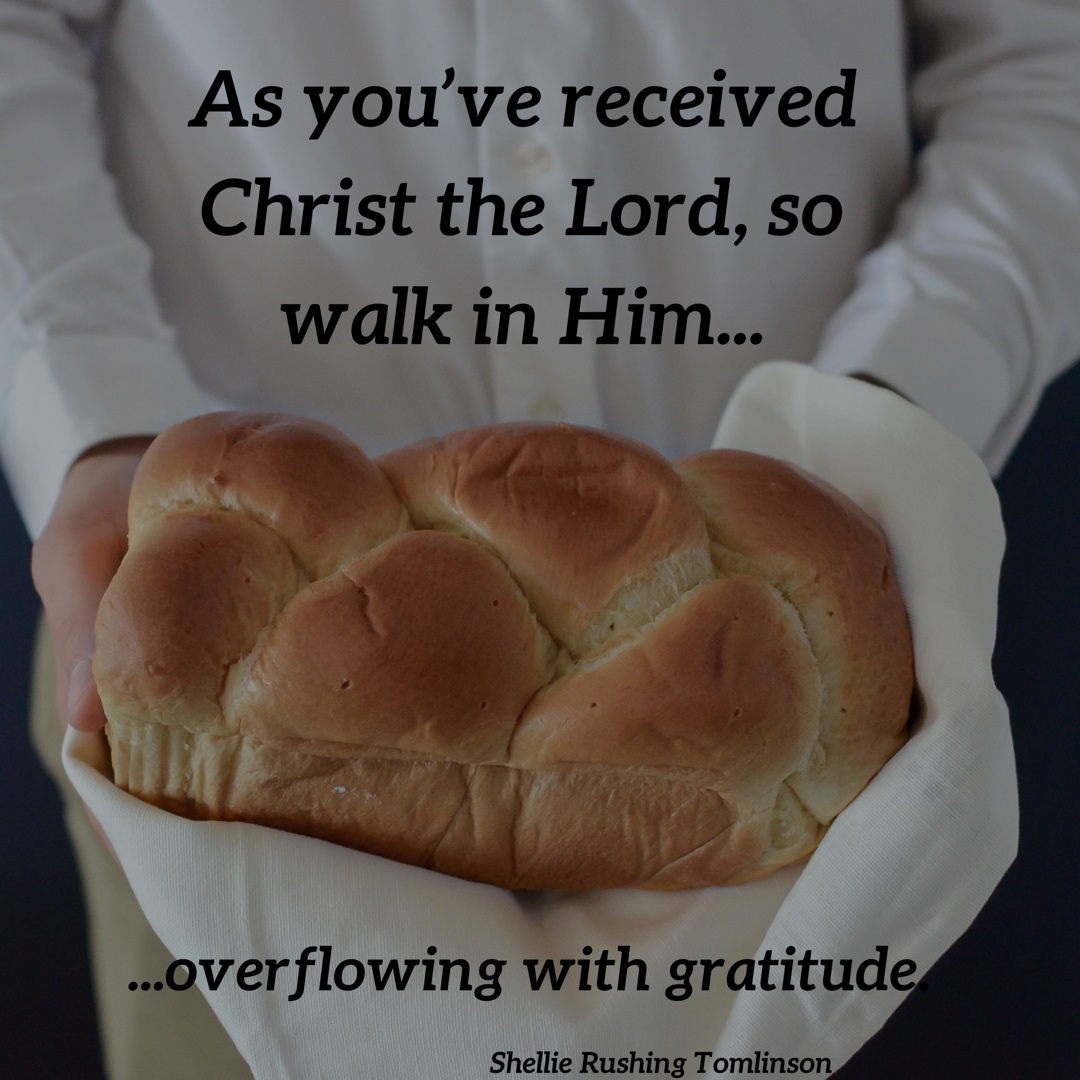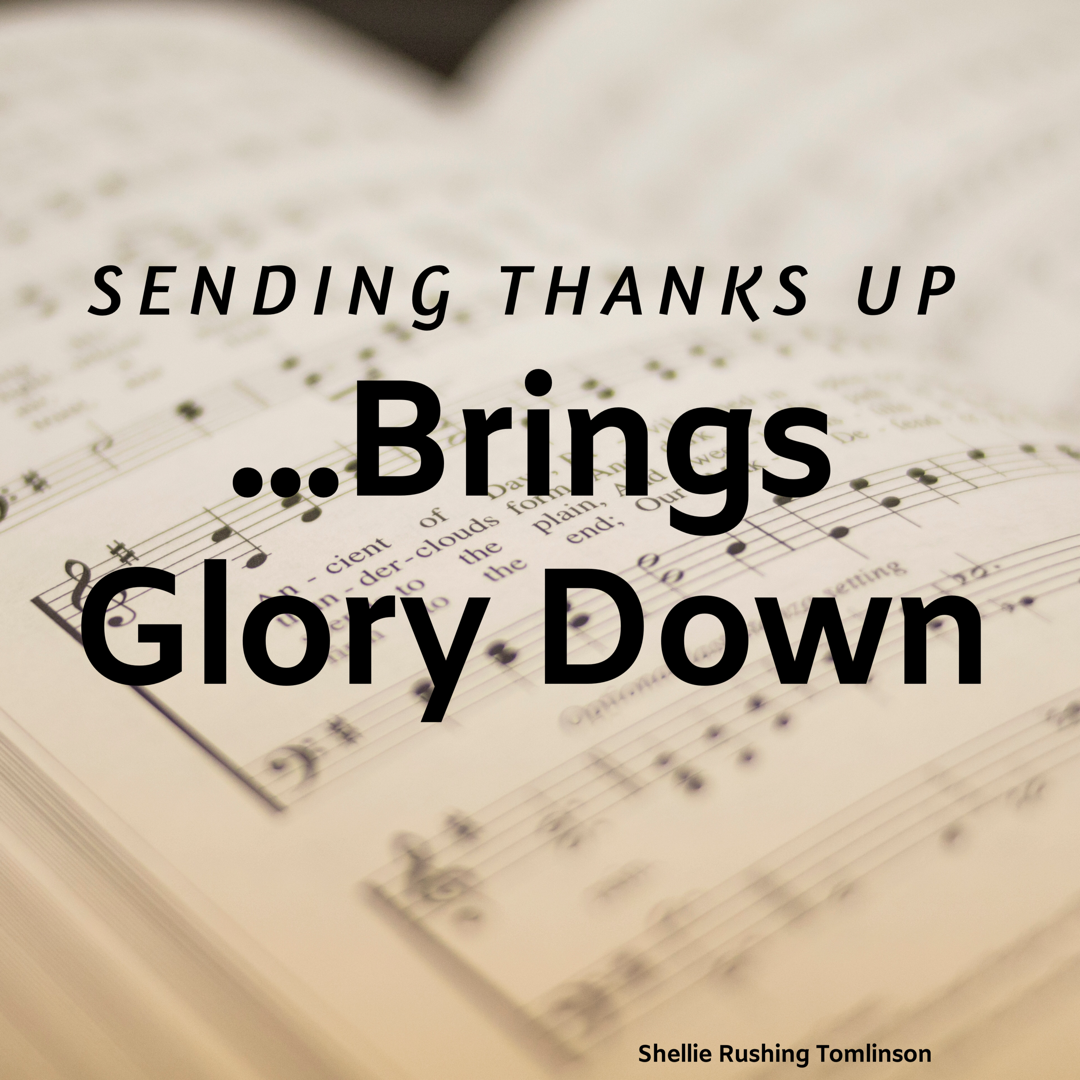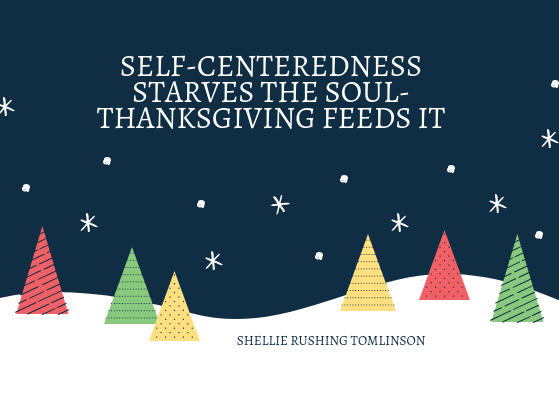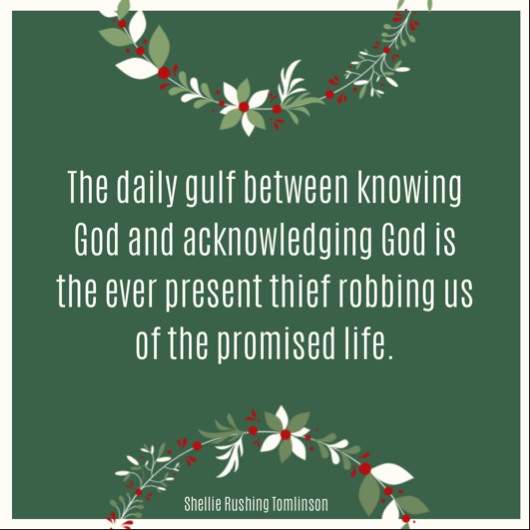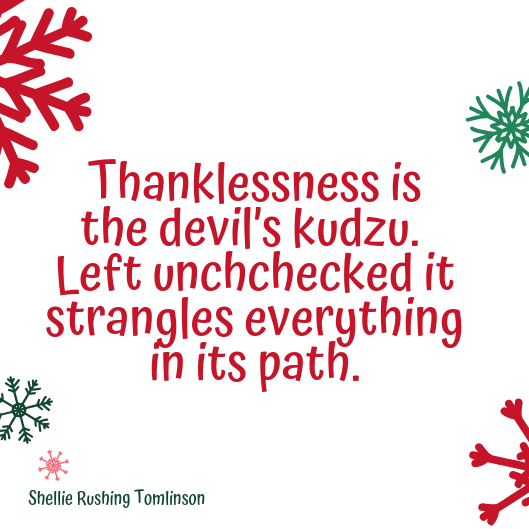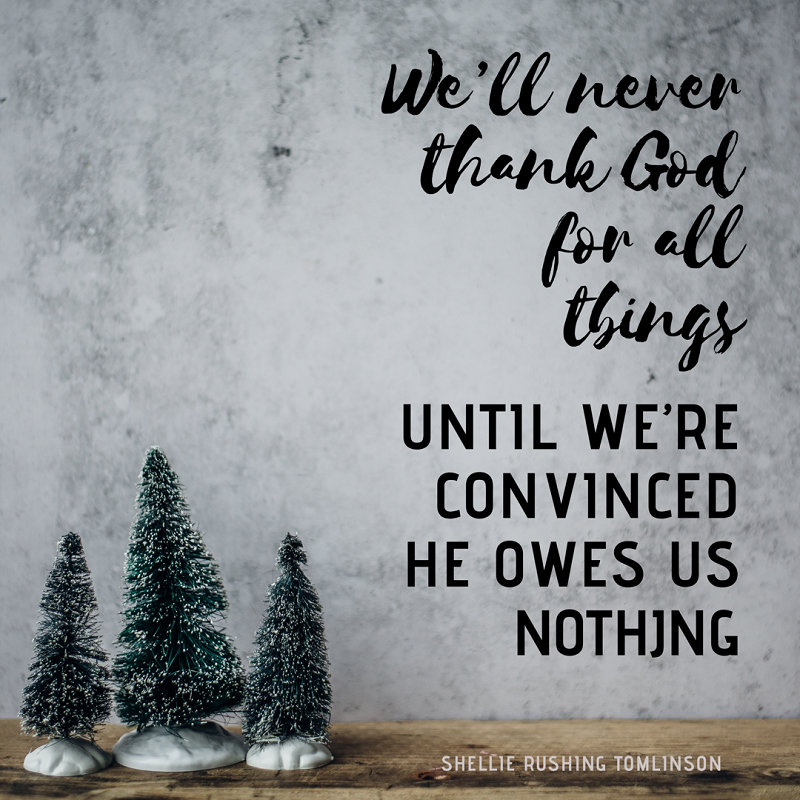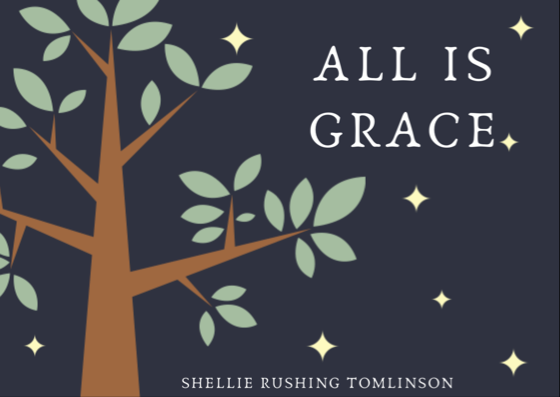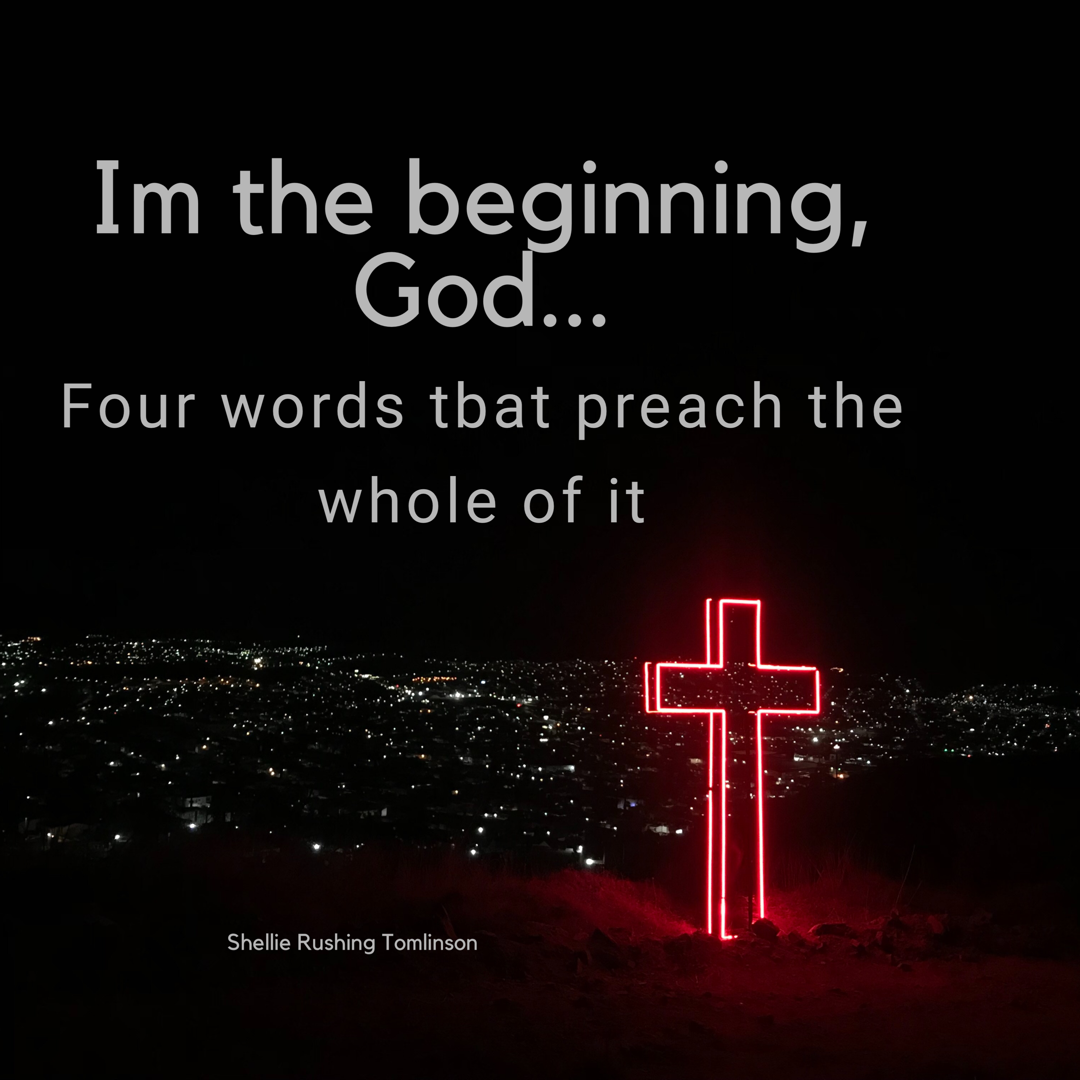Giving Thanks, a Christmas Adventure – Day Twelve
We’ve looked at Paul’s example of gratitude and we’re about to look at other of his admonitions for us to be thankful, but first I want to say something about expressing thanksgiving. I wouldn’t dream of making an over-arching ruling here, but I’ll share my opinion and experience on whether or not it is important to voice our prayers, our acknowledgement, our thanksgivings, aloud. While I
Giving Thanks, a Christmas Adventure – Day Eleven
I believe Paul learned that living in ongoing thanksgiving and acknowledgment of what was his through Christ opened him to the contentment available through communion with God— just as we established that the fellowship table of thanksgiving over the sacrifice of Christ nourishes us. Amen? Amen. Let’s examine the gratefulness teachings of Paul. Paul’s two major categories of gratefulness: 1) He was always thanking the Father for
Giving Thanks, a Christmas Adventure – Day Ten
In previous lessons we've talked about consecrating a hard moment by acknowledging God in it. The moment becomes holy when we place it on the altar because God moves in us right in the middle of our painful situation. His Presence—this is why we can learn to count the hard thing as a good thing. I want to learn the art of saying grace in
Giving Thanks, a Christmas Adventure – Day Nine
We can blunt the devil’s effective and constant bombardment of our minds with the daily challenges that come with real world living and feast with God at the same time by learning to take our trying, frustrating, and/or heartbreaking moments and give thanks in them. This is the Living Thanksgiving that feeds our souls! It’s a defense against the devil’s schemes because eucharisteō is the
Giving Thanks, a Christmas Adventure – Day Eight
OH, yes, ingratitude messes with our vision. For more kudzu, we need only keep reading in Romans. We’ll see what happens when they’re no longer thankful, broken down right here in Holy Scripture, beginning in verse twenty-five, “For they exchanged the truth of God for a lie and worshipped and served the creature, rather than the Creator who is blessed forever. Amen.” They began to
Giving Thanks, a Christmas Adventure – Day Seven
When we aren’t Living Thanksgiving, acknowledging Him, we will be acknowledging ourselves by default—convinced we deserve more of what we don’t have and less of what we’re facing. How do I know if I’m living thanksgiving, or living ungrateful with an I deserve more mentality? Simple, if I’m not in one, I’m in the other. We can take a trying moment and make it holy,
Giving Thanks, a Christmas Adventure – Day Six
If we’re going to live thanksgiving in the good and the hard, we’ll need to guard against Satan’s continual temptation that we deserve “the other tree”, something other than what we’re experiencing. And we’ll do it by following Job’s example and living in acknowledgement of God’s omnipotent rule over all that concerns us. Without this full eucharisteō in our hearts, we will always fall back
Giving Thanks, a Christmas Adventure – Day Five
To practice Living Thanksgiving, we’ll have to give up the idea that God owes us something more and learn how to accept whatever comes from His hand. But, Shellie, someone would say, Hebrew 11:6 says we are called to believe that He rewards those who seek Him! That is true. Our problem comes when we lose sight of the fact that His response to us is
Giving Thanks, a Christmas Adventure – Day Four
We saw yesterday that only one leper turned back to acknowledge the Source of the blessing, and in verse nineteen Jesus said this grateful one displayed faith that made him whole. Some of your translations will say his faith saved him. What about the other nine? Where they only healed physically, not spiritually? The Bible doesn’t say, so neither can we. But it would seem
Giving Thanks, a Christmas Adventure – Day Three
Because Adam and Eve refused to acknowledge God, to recognize Him as the source of life and all its gifts, and therefore concede obligation to His rule out of grateful hearts, fellowship with their Creator was severed. Shame on ‘em?! Not so fast. If we refuse to acknowledge God by conceding to His rule, our fellowship with Him is severed, too. Summed up our first point


